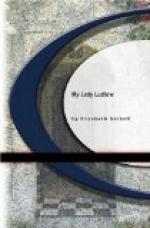Then, in this bureau, were many other things, the value of which I could understand—locks of hair carefully ticketed, which my lady looked at very sadly; and lockets and bracelets with miniatures in them,—very small pictures to what they make now-a-days, and called miniatures: some of them had even to be looked at through a microscope before you could see the individual expression of the faces, or how beautifully they were painted. I don’t think that looking at these made may lady seem so melancholy, as the seeing and touching of the hair did. But, to be sure, the hair was, as it were, a part of some beloved body which she might never touch and caress again, but which lay beneath the turf, all faded and disfigured, except perhaps the very hair, from which the lock she held had been dissevered; whereas the pictures were but pictures after all—likenesses, but not the very things themselves. This is only my own conjecture, mind. My lady rarely spoke out her feelings. For, to begin with, she was of rank: and I have heard her say that people of rank do not talk about their feelings except to their equals, and even to them they conceal them, except upon rare occasions. Secondly,—and this is my own reflection,—she was an only child and an heiress; and as such was more apt to think than to talk, as all well-brought-up heiresses must be. I think. Thirdly, she had long been a widow, without any companion of her own age with whom it would have been natural for her to refer to old associations, past pleasures, or mutual sorrows. Mrs. Medlicott came nearest to her as a companion of this sort; and her ladyship talked more to Mrs. Medlicott, in a kind of familiar way, than she did to all the rest of the household put together. But Mrs. Medlicott was silent by nature, and did not reply at any great length. Adams, indeed, was the only one who spoke much to Lady Ludlow.
After we had worked away about an hour at the bureau, her ladyship said we had done enough for one day; and as the time was come for her afternoon ride, she left me, with a volume of engravings from Mr. Hogarth’s pictures on one side of me (I don’t like to write down the names of them, though my lady thought nothing of it, I am sure), and upon a stand her great prayer-book open at the evening psalms for the day, on the other. But as soon as she was gone, I troubled myself little with either, but amused myself with looking round the room at my leisure. The side on which the fire-place stood was all panelled,—part of the old ornaments of the house, for there was an Indian paper with birds and beasts and insects on it, on all the other sides. There were coats of arms, of the various families with whom the Hanburys had intermarried, all over these panels, and up and down the ceiling as well. There was very little looking-glass in the room, though one of the great drawing-rooms was called the “Mirror Room,” because it was lined with glass, which my lady’s




